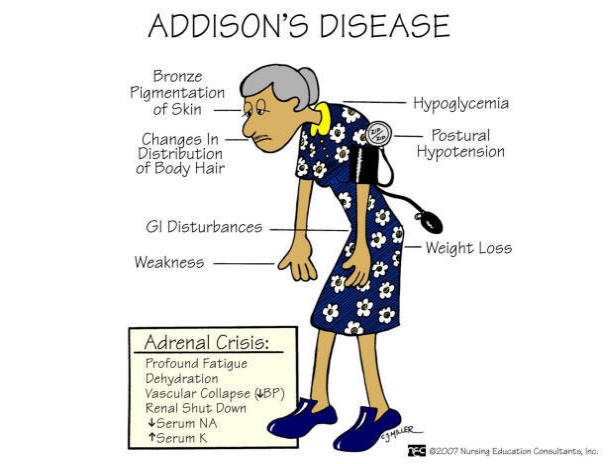|
Addisons disease
Addison's disease (chronic adrenal insufficiency) is a
rare and progressive disorder that affects between one and
six in every 100,000 people. It affects people of both sexes
and all ages.
The human body has two adrenal glands, one on top of each
kidney. These glands form part of the endocrine system,
which works with the nervous system and the immune system to
help the body cope with different events and stresses.
Addison's disease is caused by the inability of the adrenal
glands to make sufficient amounts of regulating hormones.
Adrenaline is the best known of the hormones that are
secreted by the adrenal glands in the adrenal medulla (the
central part of the gland). The adrenal cortex (the outer
part) also produces important hormones, the corticosteroids.
They include cortisol, aldosterone and supplementary sex
hormones.
In a person with Addison's disease, only the adrenal cortex
is affected. The person cannot produce enough glucocorticoid
or cortisol and, occasionally, also fails to produce
sufficient mineralocorticoid. Levels of aldosterone are
nearly always low in people with Addison’s disease.
Causes of Addison's disease
Most cases of Addison's disease are caused by an autoimmune
response that attacks and damages the adrenal glands over
time. Other causes include:
Infection
Cancer
Surgical removal of particular tumours in the adrenal or
pituitary glands or the hypothalamus.
Symptoms of Addison's disease
The symptoms of Addison's disease can include any or all of
the following:
Loss of appetite and weight
Nausea, vomiting or diarrhoea
Muscle weakness
Chronic, worsening fatigue
Low blood pressure
Salt cravings
Dehydration
Hypoglycaemia, or low blood sugar levels (especially in
children)
Increased pigmentation of the skin, particularly around
scars and bony areas
Irregular or no menstrual periods in women
Mood swings, mental confusion or loss of consciousness.
These symptoms can develop quickly (especially in children
and teenagers), or progress slowly for 20 years or more.
Many symptoms can mimic other diseases, so diagnosis can be
delayed.
The hormone cortisol
Cortisol is produced by the outer layer of the adrenal
gland, called the adrenal cortex. The quantities of cortisol
released by the adrenal glands are closely monitored by the
master gland of the endocrine system, the pituitary, which
is located in the brain.
The workings of the pituitary are governed by another brain
structure, the hypothalamus. When cortisol levels are too
low, the pituitary secretes the stimulating hormone
adrenocorticotropin (ACTH). On the other hand, high levels
of cortisol cause the pituitary gland to decrease ACTH
secretion, which slows cortisol production.
Cortisol plays many vital roles and is essential to many
body functions because it:
Works with adrenaline to help the body manage physical and
emotional stress
Converts protein into glucose to boost flagging blood sugar
levels
Works in tandem with the hormone insulin to maintain
constant blood sugar levels
Reduces inflammation
Helps the body maintain a constant blood pressure
Helps the workings of the immune system.
The hormone aldosterone
Aldosterone is a mineralocorticoid, also produced by the
adrenal cortex. The amount of aldosterone in the body is
monitored by the kidneys, which secrete hormones to increase
or decrease aldosterone production. Aldosterone regulates
electrolytes (such as sodium and potassium) in the blood.
This helps to maintain blood pressure and heart function.
If too much sodium is excreted by the kidneys, a
considerable amount of body fluid is also lost. This reduces
blood volume and drops blood pressure. Too much or too
little potassium can affect the way the heart functions.
Primary adrenal insufficiency
Addison's disease can occur gradually, and is defined when
approximately 90 per cent of the adrenal gland(s) is
damaged. This is known as primary adrenal insufficiency.
Around seven out of 10 cases of Addison's disease are caused
by an autoimmune response, where the body's own immune cells
attack and destroy the adrenal glands. In some cases, other
glands of the endocrine system are affected by an autoimmune
response, in a condition called polyendocrine deficiency
syndrome.
|
